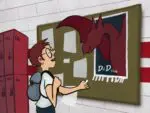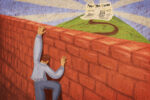Internet games hold a subtle and impactful power in the ever-growing online landscape. If you’ve ever played games on a smartphone, did you have a favorite trending game that you jumped on? Were you a fan of the Angry Birds takeover, or the short-lived Flappy Bird excitement? Game trends come and go so quickly that one doesn’t even realize that they were popular until they’re gone. But how do the fans who make these games “trendy” ultimately forget about them at the drop of a hat? The masterminds behind fan-favorite games play a big part in what’s popular and available in the here and now, which tends to sway players against their former favorites. Nothing’s clearer about such a reaction than the rising success — and potential fallout — of Wordle.
So, what’s this Wordle wonder that has captivated the minds of millions? Wordle pieces together a winning balance between challenge and satisfaction. Essentially, the Wordle in question is a specific word that the player has six chances to guess correctly. Since each chosen word is only five letters, even the limited number of guesses feels generous. However, that’s not to say that the game isn’t a challenge; a five-by-six grid of tiles and a grayed-out keyboard are the only “hints” offered to the player. With each word that a person tries, the grid reveals how “close” or “away” a person is from the correct answer.
Each letter tile on the grid will turn green to signify a correct guess, yellow means you’re getting warmer and gray means you’re completely off. After the guesses are made and the Wordle is solved, players, unfortunately, must practice patience: There’s only one official Wordle each day, prompting people to come back tomorrow for a new word. As CNET put it, “It’s fun, simple and, like a crossword, can only be played once a day.” However simple it may sound, the changing nature of the daily Wordle keeps players on their feet — or more appropriately, glued to their screens.
Josh Wardle, the software engineer behind the game, intended for Wordle to be sweeter than a successful guess. As a gift for his crossword-loving partner, Wardle put his skills to the test and created a new word game for his partner to enjoy. With a personal pun and a sense of affection in tow, the Wordle game saw the light of day. Fast forward to October 2021, the once sentimental gift between lovers broke out into the public domain for all to play. The game quickly picked up speed, as every wordsmith and word novice got to talking about the Wordle tiles.
Throughout the months that followed Wordle’s debut, the community that blossomed from the game reaped the greatest rewards. Not only were people trying their hand at guessing the daily word, but players were now chatting with each other about it. Like discussing strategies for console games, people looked to their friends, families and even the internet to chat about the wonders of Wordle. Even more intriguing is that no one is praised for solving a more “challenging” Wordle than someone else because everyone gets to play for the same word each day. As CNET reflected on the phenomenon, “It makes it easier to ping your buddy and chat about the day’s puzzle.” Just as if a person was sitting at a table, playing a board game across from a friend, the Wordle’s strict one-a-day dose builds a sort of community around the online gaming experience.
The Wordle community soon sprouted on social media. Avid players started posting their results on Twitter using emoji squares to mimic the game tiles. For the unfamiliar eye, deciphering these squares seemed akin to decoding some kind of word-related hieroglyphics. But the clever use of black, green and yellow emojis to show one’s gaming strategy allowed players to compare results without leaking the Wordle in question.
Luckily, game founder Wardle caught onto this trend and soon added a “sharing” button for players to easily paste their results everywhere. Sneakily finding ways to talk about the game “in a way that won’t give away the day’s word to anyone who hasn’t played it yet,” also widens the scope of who can take part in the game. Sharing these Wordle results via Twitter invites curiosity for more Wordle hopefuls who may enter the community, rather than excluding those who don’t understand yet.
Stalking the tail end of Wordle’s skyrocketing success was The New York Times. After admiring the game’s popularity from afar, the NYT eventually bought the Wordle game from its creator in January of this year. Because NYT is infamous for its word puzzles — even going so far as to influence Wardle’s invention — it’s a no-brainer that one of the largest publications in the world also wanted the newest and trendiest word game under their belt. The company spared no expense for Wordle as well: The NYT purchased the game from Wardle “for an undisclosed amount in the low seven figures.” While the word “low” does little to subdue the whopping seven figures the NYT forked over, the change sparked mixed feelings across the net.
For Wordle’s Wardle, the transition to NYT granted him significant compensation for a game that he created for fun. Undoubtedly, the benefits of an overnight trend going back to the person who started it all serve as the most important part of the whole transition, regardless of what players have to say. Wardle’s fun little game gets roped into one of the most well-known platforms on the internet while getting the opportunity to bring along old and new fans for the ride. Nevertheless, the respect granted to Wardle does not override the fact that players were everything but excited for the changes with their Wordle.
On the surface of the switch, nothing is incredibly different about the beloved word game; the same tiles and strategies are just redirected to a new URL. However, heightened anxieties sparked from the get-go: On the initial day of the transition, players everywhere were frustrated by two “correct” answers from two different websites. The influx of changes continued to grow, from words cut from the guessing list to a flood of ad trackers attached to the site.
At the core of it all, fans were displeased with the fact that a large organization such as the NYT had to capitalize on the fun (and fleeting) Wordle trend. To quote from The New York Times Company, “We’re thrilled to announce that we’ve acquired Wordle, the stimulating and wildly popular daily word game that has become a cultural phenomenon.”
Even though they acknowledge the cultural impact of the game, the NYT ignored the fact that they are perhaps undermining what made it such a fascinating cultural artifact in the first place. The problem does not necessarily focus on the NYT specifically, but rather faces head-on the implications of monetizing that which is made for pure enjoyment. As Wardle initially noted on the game, “I think people kind of appreciate that there’s this thing online that’s just fun.” If good, free fun is at the center of the Wordle tiles, will that change under this new ownership?
In theory, the game will mostly remain the same under the NYT. Even so, fans are troubled by the possibility that the NYT will absorb the game into their subscription plan in the future. While the move to paid gaming makes sense — after all, Wordle is now a part of NYT Games — it’s the two-inch paywall blocker that brings tensions to the tiles. If you’ve ever logged into the NYT site as a non-subscriber, you must be familiar with the “You’ve reached your limit of free articles” banner that pops up. Throwing the fun and initially free Wordle game behind that barrier cuts it off from the community it was first given to. Again, while the theory of paying for Wordle is still a theory, it does bring a gloomy air to a stress-free activity. As the heated Gizmodo reported on the Wordle transition, “It will be missed (as a standalone site that seemed to eschew the capitalistic pressures to monetize every last godforsaken inch of life but has now been revealed to be a lie all along).”
How does one respond to this entire ordeal? With Wordle wavering from one owner to another, and the complications that followed, some tech-savvy fans took the word game back into their own hands. In no time at all, “spoofed” versions of the original Wordle game were popping up across app stores and web browsers alike. From a Wordle knockoff that allows you to play infinitely in one day, to an article detailing the different “bootlegged” games out there, it seems like everyone wants a piece of the Wordle pie.
Some players even took the strategy concept of the Wordle game to new heights — and new stressors. A recent trending event on Twitter highlighted Quordle, a Wordle-like game where players have to guess multiple words at once. The Quordle, however, raised the stakes of the tile-guessing game by allotting just nine total chances to guess four different words. Though some of these new word games spin the Wordle concept on its head, having these adjacent additions show how important the freedom and flexibility of the initial game were. The no-brainer simplicity of Wordle was what attracted people to the game in the first place; when the ease of access becomes locked behind a monthly-fee fence, those initial pleasures will fall away as well.
While it can’t be helped that trends come and go each year, it’s remarkable how much those trends are out of the control of the people who embrace them. Especially in the sector of web games, there are so many ways that change occurs without the everyday person realizing it. One day Wordle is dominating the social gaming scene, the next brings it front-and-center to heated, capitalistic-based debates. Like Wordle, was it possible to predict the downfall of other fan-favorite games, or is it all happening in the blink of an eye? With games like Flappy Bird pulled from the App Store to Angry Birds migrating to film, these dominating changes seemed to water down all the love that made them popular in the first place. At this rate, it looks like Wordle will need more than six guesses to continue winning the players’ favor before it runs itself into the gaming graveyard.

















